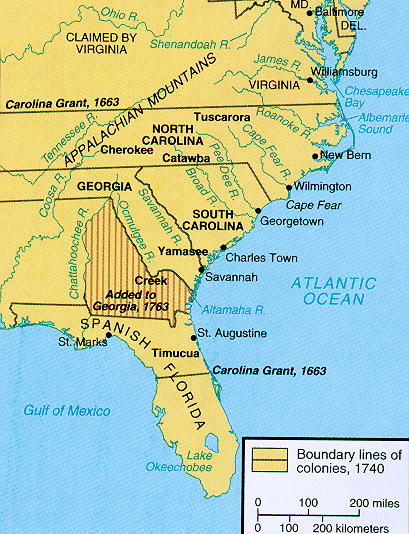The Thirteenth Colony: Georgia
Georgia was founded in 1733 by James Oglethorpe, governor who ran the colony with military discipline. It was originally part of the Carolinas but later given its own charter by the King. King James II had two main reasons to give Oglethorpe the charter for the land which named in his honor. Georgia would serve as a "buffer colony" to separate North Carolina from Florida and Louisiana. It was imperative for the King to do so in order to lessen the vulnerability to attack from the Spanish settlers of Florida and the French from the Louisiana territory. Since the Carolinas was valuable with the riches it provided to the King and a steady economy. Georgia also contributed to the halt of French expansion to the North. Georgia also served as a haven where previously imprisoned debtors could start anew. Therefore, the colony of Georgia was an interest to poor Englishmen where economic relief and land would be given.
The boat reached Charles Town and sailed through the Savannah River with a population of one hundred and sixteen. James Oglethorpe, the first governor, kept his colony organized by first constructing a fort with guns to prioritize the safety of his people. He then began to develop friendly relationships with the Natives, mainly the Creeks, where he compromised for the land he desired. Mary Musgrove, an Native women, served as a translator for Oglethorpe for which she was payed heavily; however, she deceived the Creeks proclaiming herself their Queen succeeded in convincing them to fight the English. Oglethorpe did not shed any Native blood to seize the war and imprisoned Mary as the Creeks realized they were deceived. A few years later John Wesley came to Georgia to convert the Natives and later returned to England to found the Methodist Church.
Oglethorpe had strictly regulated the laws of Georgia which impeded its growth compared to other colonies. The intentions for which the rules were set up was to maintain the morals and health of the society. First, in failure of male succession the land was returned to the state with exceptions of of widows. Second, trade with the Indians was prohibited unless a social licence was provided. Lastly, African slavery and rum was absolutely denied to the colonist. However, the prohibition of slavery changed in 1749 which allowed it under humane treatment of the slaves. Georgia's economy then depended on the use of African slaves for the plantation system. In 1740 Georgia and other states marched to St. Augustine and returned in failure by 1742 the Spaniards sailed to Georgia to settle the score and captured Oglethorpe. The Carolinas agreed to send supplies; however, the Spaniards thought they were battleships and fled saving both states from ruin. In 1752 Georgia became a royal colony which led to the experimentation of of slavery similar to other southern states. Silk and wine was a trial of Georgia's industry as rice, indigo and fur trade became a success in the economy.


Exactly 110 years after the New Hampshire colony!
ReplyDeleteSo the colony was basically created for military purposes?
ReplyDeleteYes, at the beginning it was. The. English needed a barrier to protect the Carolinas from the Spaniards of Florida.
DeleteWas it necessary to have Georgia as a "buffer colony"?
ReplyDeleteYes, the Spaniards were trying to gain more land north of Florida but could not continue when Georgia was claimed. Also, it made it difficult for the Spaniards or French from gaining access to the luxuries in the Carolinas.
DeleteDid the "buffer colony" actually help with attacks as it was intended to do so?
ReplyDeleteWas Oglethrope only generous to the Natives for his own benefit or for them?
ReplyDeleteHe found a way to comprise with the needs of the natives while gaining what he wanted, a win-win situation.
DeleteI find it interesting how keeping the Colony regulated and under controlle prohibited it from growing instead of helping it.
ReplyDeleteWhat caused there to be such a change in having slaves?
ReplyDeletePatrick Tailfer and Thomas Stephens had petitioned the crown for the use of slavery because the economic growth of Georgia was mediocre compared to its southern neighbors; they argued African slaves would adapt to the weather and prove to be necessary for the plantations.
DeleteWas there any specific religion in your colony?
ReplyDeleteNo, it was religious tolerant with the exception of Roman Catholicism since it had immigrants from Scotch, German, and Swiss.
DeleteYes, during its early colonization it was; however, in 1749 an act which permitted slavery with humane treatment was passed and in 1752 Georgia treated slaves as other southern states
ReplyDeleteYes, during its early colonization it was; however, in 1749 an act which permitted slavery with humane treatment was passed and in 1752 Georgia treated slaves as other southern states
ReplyDeleteYes, during its early colonization it was; however, in 1749 an act which permitted slavery with humane treatment was passed and in 1752 Georgia treated slaves as other southern states
ReplyDeleteGood work...and great responses to classmates!
ReplyDeleteI notice a correlation between Mary Musgrove and La Malinche.
ReplyDelete